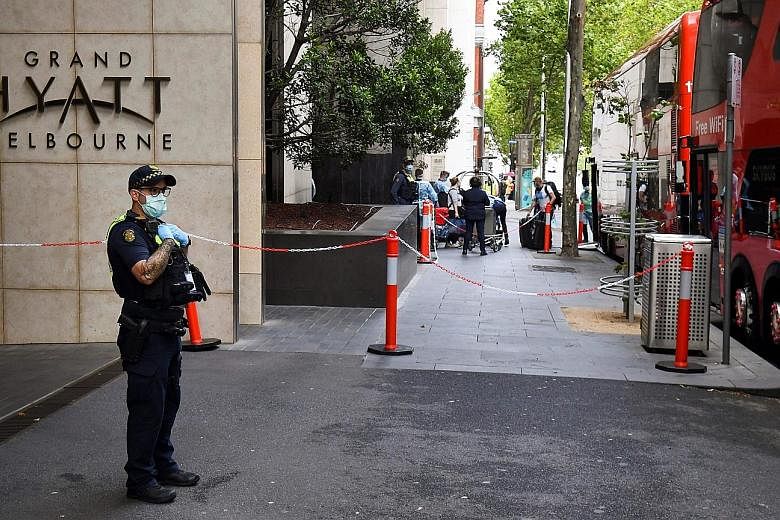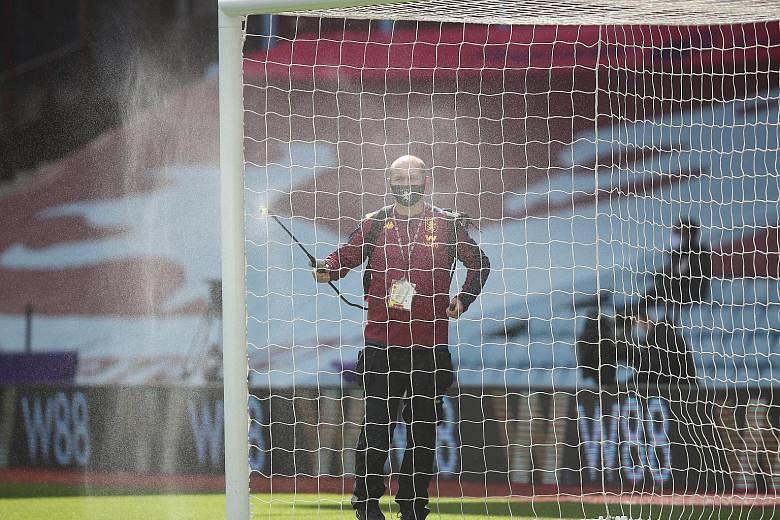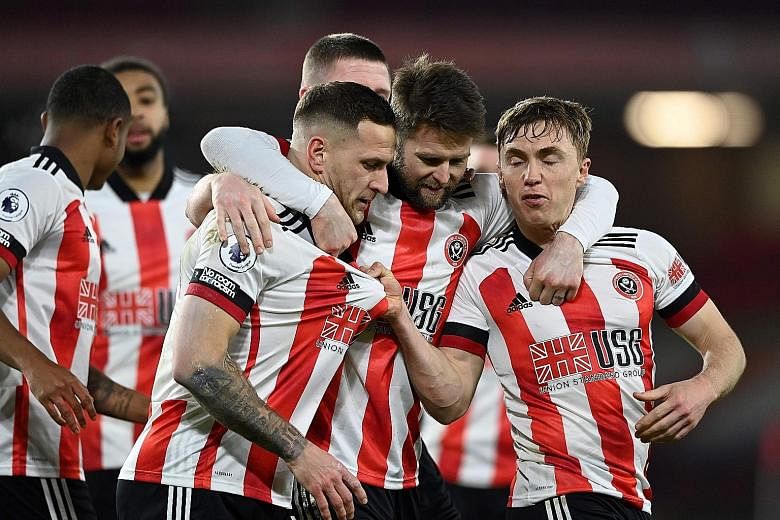LONDON • Eleven months in, there are little signs of the coronavirus pandemic slowing down. It remains to be seen if the 95 per cent efficacy rate of the Pfizer-BioNTech and Moderna vaccines holds up as tens of millions more around the world start to get vaccinated.
As such, the World Health Organisation warned that sizeable herd immunity will not happen until next year and research is still being done to determine if the vaccines in circulation work against new mutant variants like the B117 strain in the UK, the E484K South African strain and the Brazil strain, which are all more transmissible.
With all these hurdles and pro athletes not among the first to be vaccinated - leagues have insisted they do not want to be seen jumping the queue ahead of front-line workers - the virus continues to pose a big danger to sports competitions for the foreseeable future.
FRESH CONCERNS
Earlier this month, the Premier League revealed a record 40 positive cases among staff and players, and already five games have been postponed.
Manchester United and Manchester City started the season a week later than other clubs yet their two opening fixtures were only staged earlier this week.
There are increasing concerns the Premier League is running out of dates to hold rearranged games, particularly if more get delayed because of Covid-19.
The league campaign is set to conclude on May 23, while the delayed Euro 2020 is scheduled to start on June 11, leaving little room to work with since there is also the Champions League and Europa League to factor in.
The National Basketball Association (NBA) season, which tipped off late last month with a shortened 72-game regular season schedule, has already delayed 12 games due to positive tests and Covid-19 protocols.
ACROSS THE BOARD
Other competitions that have not commenced are bracing themselves for similar disruptions.
Formula One, which is attempting to put on a record 23 races next term, this week moved the Australian Grand Prix season-opener from its traditional March slot to November, while the Chinese GP has been left off the calendar for the second year running unless "circumstances allow" and another race drops out.
Tennis' Australian Open is already being held outside of January for the first time since 1987 and while the Grand Slam is scheduled to go ahead on Feb 8, there are already growing concerns. There were two positive cases on an inbound flight on Friday, while media reports yesterday said a second charter flight has been compromised by a positive Covid-19 test.
This year's sporting calendar is dominated by the delayed Euro 2020 and the Tokyo Olympic Games yet both remain in doubt.
Euro2020 organisers are preparing for all eventualities, including having fewer host cities from the proposed 12 and this week said they will make a decision on the tournament's fate by March.
The Japanese government and the International Olympic Committee (IOC) continue to insist the Games will be held in July even though a month-long state of emergency has been declared in the greater Tokyo area and other major cities like Osaka and Kyoto.
But public disquiet is building. Over 80 per cent of respondents - a record high - in a recent poll by Kyodo News favoured either another delay or cancellation.
On Friday, Taro Kono, a member of Japan's Cabinet, broke with his government's official line, saying the Games "could go either way", following similar comments this week by Dick Pound, the longest-serving IOC member, who told the BBC that there was "no guarantee" the Olympics would take place.
TIGHTENED REGULATIONS
In response to the worsening situation, the Premier League has tasked compliance officials and referees to remind captains and managers to observe safe distancing guidelines, including stopping celebrations like hugging and handshakes during goal celebrations.
Other stricter measures include two rounds of testing weekly, up from once a week, to requiring substitutes to wear masks.
With the UK under its third national lockdown, patience is reportedly "wearing thin" as top-flight football, which operates under semi-bubble conditions, is still being held while the rest of the country is at a virtual standstill.
The Premier League "has not discussed pausing the season and has no plans to do so" but all games will continue to be hosted behind closed doors, ending a short-lived experiment last month which allowed up to 2,000 fans to attend games in selected areas of the UK.
The NBA has gone a step further, expanding its health and safety measures this week to try and double down on keeping teams away from infections arising from outside of its semi-bubble.
These include requiring players and staff to remain in their homes or hotel rooms except to attend team activities or take care of their essential needs and banning hugs.
The league deems the stricter rules as necessary to deal with the spike in cases, particularly as there is no intention to return to the bubble format that was so successful from July to October, with no cases reported in Orlando, Florida.
Japanese officials are also considering limiting athletes' movement while they are in Tokyo for the Games and pondering whether to implement a ruling requiring them to leave the Olympic Village as soon as their competition is done.
ATHLETES FEELING FATIGUED
However, all these countermeasures are starting to get to the very athletes they are trying to protect.
Since last year, players have complained about the soulless atmosphere of empty stadiums and the newer rules that curbs on celebrations will be enforced has left some in the game annoyed.
City manager Pep Guardiola believes players should not be held accountable as celebrations occur "in the moment".
West Bromwich Albion counterpart Sam Allardyce added: "I can't have meetings with more than 10 in a room, so why are they (the authorities) thinking we are doing it wrong? Just because we're celebrating scoring a goal? Come on, that's not right."
Andre Sa, the Australian Open director of player relations, has also claimed that Roger Federer pulled out of the Australian Open due to family and quarantine worries, rather than a lack of match fitness, having undergone two knee surgeries last year.
"The main reason was the quarantine," he said. "The problem is that Mirka (his wife) and her children couldn't leave the room. They would have to stay 14 days in the room.
"The other option would be for him to come alone... And then he said, 'Dude, 39, four kids, 20 Grand Slams. I am no longer in time to be away from my family for five weeks'."
World No. 25 John Isner has withdrawn from the Open for that same reason, citing the quarantine requirements if he were to bring his family along and that "tennis is not the most important thing in my life".
Bubble conditions also led to Avery Bradley skipping the remainder of last season as his then team, the Los Angeles Lakers, went on to claim the NBA title.
Amid all the stricter regulations, it is a reminder that pro athletes, despite their privileged status, are still human beings with families to go home to at the end of the day and mental health is crucial to maintaining peak form.
That is why Elina Svitolina has recently hired a mental coach as she undergoes her two-week quarantine Down Under.
"During the difficult time right now, I think mentally it's very important to stay strong, stay fresh," tennis' world No. 5 said.
"With all the (closed-door) tournaments that are going to happen right now… you have a different kind of pressure... I think this is the right decision for me right now."
AGENCE FRANCE-PRESSE, REUTERS



